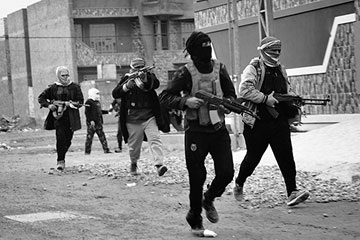
Tribal fighters patrol Fallujah streets on Jan. 5 as the Iraqi government faces off against al-Qaeda forces.
Few Iraqi cities bear in their dust-covered stones the tragic symbolism of America's misbegotten war like Fallujah does. It was there, in March 2004, that angry mobs pulled four Blackwater USA contractors out of their vehicles, dragged them through the streets and hung the bodies of two of them from a bridge over the Euphrates in an unforgettable sign that America was not, in fact, a welcome liberator. And it was there, in the months following, that U.S. forces redeemed the possibility of a peaceful Iraq, fighting house to house, up close and personal, in a costly but successful effort to clear the city of insurgents and make it safe for handover to Iraqi government forces.
So the pain was anything but symbolic for U.S. veterans of the Iraq War when they learned that the city had fallen again on Jan. 4, not just to armed rebels eager to oust the Baghdad government but to a powerful al-Qaeda affiliate that is among the most feared in the Middle East. The group, known as the Islamic State of Iraq and Greater Syria (ISIS), had emerged from weeks of chaotic fighting in Anbar province to drive police and the army from the town. By Sunday night, ISIS fighters had reportedly taken down and burned all the Iraqi flags from the city's buildings and raised in their place the black banner of al-Qaeda.
ISIS is a threat well beyond Fallujah, thanks to the leadership of Abu Bakr al-Baghdadi. With a Ph.D. in Islamic studies from the Islamic University of Baghdad and a decade of brutal fighting under his belt, the 42-year-old Iraqi has risen in the ranks of al-Qaeda as few other local affiliate leaders have around the region and the world. He has even been so brazen as to pick a fight with Osama bin Laden's successor, Ayman al-Zawahiri. And though he has shown little appetite to attack the U.S., he represents the kind of Islamic extremist who counterterrorism officials believe may pose the greatest terrorist threat to Americans in the post--bin Laden era. Yet he is all but unknown to the general public. The only photograph of him in circulation is a grainy shot the U.S. State Department uses to advertise the $10 million price tag it has put on his head.
More immediately, Baghdadi and ISIS represent a clear and present danger to America's allies and interests in the broader Middle East. Baghdadi has led his fighters across Iraq's western border into Syria's civil war, drawing new recruits and seizing and holding territory there. Baghdadi's jihadists are now as large a day-to-day influence on civilians' lives in areas they control as any al-Qaeda group since bin Laden's men enjoyed the freedom of pre-9/11 Afghanistan. Even as Bashar Assad's forces in Syria made military gains against all rebels, including ISIS, in the past several months, Baghdadi's forces were able to open a new front in neighboring Lebanon, taking responsibility for the Jan. 2 suicide car-bomb attack in southern Beirut that killed five and injured scores.
